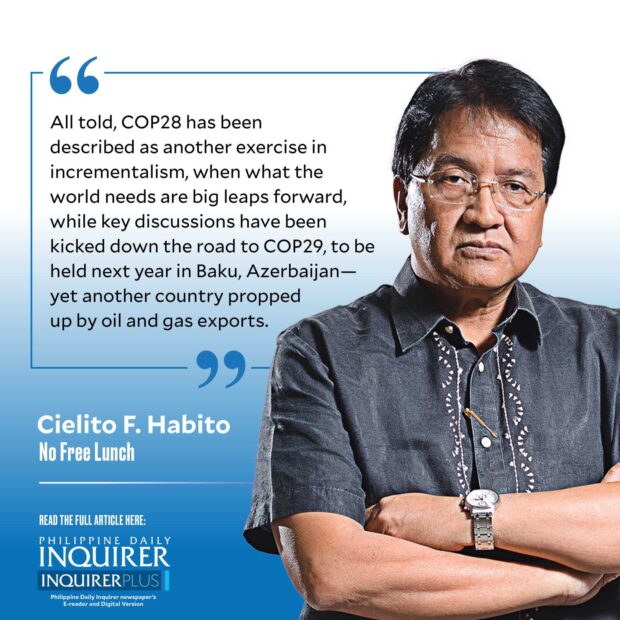Progress, cop-outs in COP28

This year has been the warmest that planet Earth has seen in the last 125,000 years, scientists tell us. Its harmful impacts are felt worldwide, through melting glaciers in the North and South Poles and mountain ice caps (and the havoc caused by the resulting waters); devastating wildfires in the United States, Australia, and other parts of the globe; droughts induced by El Niño that destroy crops in vast farm areas, especially in the tropics; coral bleaching that ruins fish habitats; and more. This is not to mention its direct effect on humans, where an increased incidence of death from heat strokes is but one manifestation.
The earth is getting warmer, and climate patterns are changing all around the globe because of it. Hardly anyone now disputes that, and all of us have felt it. But it took 28 years from the time nearly 200 states began negotiating the United Nations Framework Convention on Climate Change (UNFCCC) in 1995 for them to finally reach a consensus that humans are indeed causing it, especially through their excessive use of fossil fuels. The recent COP28, or the 28th annual Conference of Parties (i.e., states) that signed the UNFCCC, reached what is described by its president as a “historical” agreement that for the first time explicitly recognizes the need to “transition away from fossil fuels in energy systems.” Before that, there had been endless debates on whether human beings were to blame for climate change, or natural factors are behind it. But the scientific community has unmistakably tracked an unprecedented and striking rate of temperature rise in recent decades, lending credence to the human explanation for global warming and the climate crisis, thus finally leading to the historic consensus.
COP28 was in itself historic in being the most highly attended so far, with reportedly over 100,000 registered delegates, about twice what had been usual in past gatherings. But observers also noted much stronger participation by the “climate change villains,” with 2,000 of the registered delegates officially representing fossil fuel companies. There was a seeming irony itself in the choice of host city for the meeting, being in a country (the United Arab Emirates) whose economy heavily relies on revenues from petroleum. And critics regarded with suspicion the host country’s appointment of Sultan Al Jaber, head of the Abu Dhabi National Oil Company, as president of the conference.
It was no surprise, then, that many remain dissatisfied with the outcomes of COP28, notwithstanding the historic reference to transitioning away from fossil fuels. For one thing, the use of the word “transitioning” was a letdown for most of the participating countries, who wanted phasing out or even phasing down, rather than the lamer language that emerged. Furthermore, the agreed transition away from fossil fuels was limited to energy systems and does not cover their use in plastics, transport, and agriculture. In many countries including the Philippines, the greater part of carbon dioxide (CO2) emissions into the atmosphere actually comes from motor vehicles, and less from energy facilities and power plants. We also have the dubious distinction of being one of the world’s top sources of plastic waste polluting the waterways and oceans. Our high level of dependence on petroleum-based chemical fertilizers is likewise seen to make our agriculture and food systems unsustainable.
Analysts point to other areas of positive movement in the COP28 outcomes, including firmer finance to address loss and damage from climate change in vulnerable nations; higher climate finance commitments from developed nations for mitigation and adaptation initiatives in developing nations; explicit timeline goals for water security, ecosystem restoration and health; and greater alignment around reductions in CO2 and non-CO2 emissions to keep within the target maximum of 1.5 degrees Celsius rise in global temperatures above pre-industrial levels, and net zero emissions by 2050.
On the other hand, there was disappointment over the watered-down language on fossil fuels, particularly on coal, where earlier proposed language to “rapidly phase down unabated coal” and put “limitations on permitting” coal ended up just referring to “efforts towards the phasedown of unabated coal power.” There was also no progress in defining clearer mechanisms for trading carbon credits, which the Philippines can potentially benefit from by earning export revenues from carbon sequestration opportunities that abound in the country. All told, COP28 has been described as another exercise in incrementalism, when what the world needs are big leaps forward, while key discussions have been kicked down the road to COP29, to be held next year in Baku, Azerbaijan—yet another country propped up by oil and gas exports.
cielito.habito@gmail.com




















